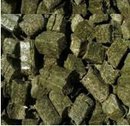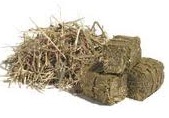| Home Feeding Horses | First Posted: Jan 10, 2011 Jan 21, 2020 | |
Feeding Horses Hay Cubesby Debora Johnson  Alfalfa Hay Cubes (left) and Timothy Hay Cubes (right) What are hay cubes? Are they a good source of forage for your horse? What type of hay cubes are available? What are the advantages and disadvantages of feeding hay cubes? Lets take a look. What Are Hay Cubes?Hay cubes are simply hay that has been harvested, cut into small pieces and compressed. "The most popular types of forage cubes are made from coarsely chopped alfalfa hay, timothy hay, alfalfa/grass hay, whole corn plants, and alfalfa hay/whole corn plants." (Kentucky Equine Research nutritionist Kathleen Crandell, PhD) Manufacturers add different supplements such as protein, important minerals, oils and molasses. Check the label to find out what has been added. Caloric content should also be available on the label. By visual inspection you can determine the quality of the hay cubes just as you do with hay bales. You smell them, look at the color and texture. Are Hay Cubes A Good Source of Forage?Hay cubes are a good source of forage and are appropriate for horses of all ages. Hay cubes are even suitable for broodmares and young horses because of the high nutrient values for energy, protein, and calcium, however, you must be careful to check on the type of hay used in the cube. As with any addition to your horse's diet you must start slowly. Cubes can be used to supplement your horse's hay or replace it. It can be used to stretch a limited supply of good hay. Eventually you can feed 75% to 80% as much cubes as hay by weight, as a rule of thumb. Again, caution, you must start slowly. Some Advantages of Hay Cubes
For More Information: Selecting Quality Hay for Horses/Purdue UniversityAlfalfa Cubes for Horses |